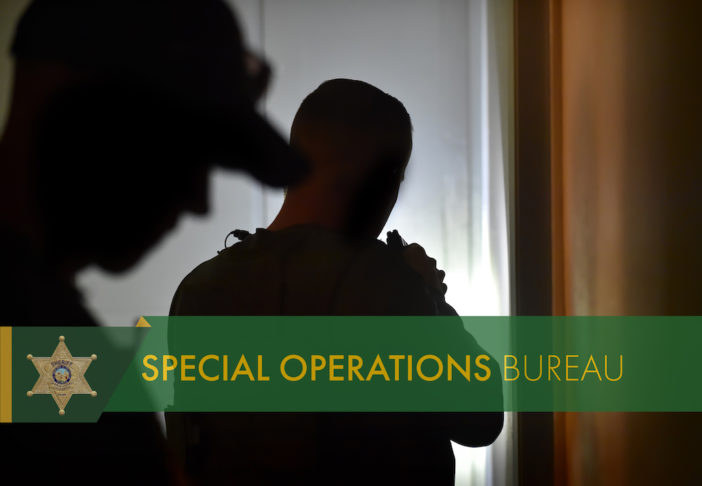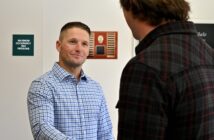Editor’s note: The Orange County Sheriff’s Department submitted this story about the retirement of legendary Investigator Bill Beeman to Behind the Badge.
In the criminal world of Southern California’s white supremacist network, Bill Beeman is a household name.
Stories have been told, swelling with hyperbole with each iteration, about the investigator who infiltrates gangs and dismantles their criminal plans.
Nicknamed the “Rhinestone Cowboy” by one gang member, Beeman was the man scarcely seen, but widely feared.
There was the time he rappelled out of a helicopter to arrest a known white supremacist involved in a homicide.
And the time he was spotted undercover as a UPS driver, keeping tabs on the activities of one gang. Another person shared that Beeman was seen posing as a homeless person outside a hotel monitoring the comings and goings of people of interest there.
There also was one woman convinced she was involved in a romantic relationship with Beeman while he was undercover. She was sure she’d shared some incriminating information, leading to an arrest of a friend.
Of course, none of these stories are true, but Beeman is certainly entertained by them.
“They make up stories about me all the time,” he said. “They just think I’m everywhere.”
In a way, he is.
BLUE-COLLAR APPROACH
There is nothing rhinestone about Beeman, but he definitely is a little bit cowboy.
He prides himself on taking a blue-collar approach to his work. He’s not a clock-watcher and he’s not a complainer.
On his pre-dawn commute he pores over his cases. He listens to interviews, he makes mental notes.
He eats lunch at a desk stacked with case files and photographs. He prefers face-to-face interaction over emails.
He drinks his coffee black.
He’s approachable and unassuming, with a wide smile and a contagious laugh.
He’s smart.
Beeman is the stuff crime novel writers make lead characters out of – a cop’s cop with an old-school manner of doing business that produces results.
He started the way all Orange County Sheriff’s Department deputies do: in the jails. He worked patrol in Dana Point, SWAT and gangs before promoting to investigator, where he worked sex crimes and Sex Offender Notification and Registration (SONAR).
For the last 13 years, he worked special operations where he “does mostly white supremacists, with murder-for-hire on the side,” as he described his role.
He also is part of the Orange County Sheriff’s Department team tasked with providing security when dignitaries like high-profile politicians are in town.
He’s provided security for five presidents, billing George W. Bush as the best. (He carried his own luggage and made a point to shake hands with everyone he passed.)
“He was just a really respectful and really nice guy,” Beeman recalled.
Beeman also is seen as the de-facto expert in white supremacist gangs in Southern California. He gets called on by agencies across the region for his take on the dynamics of a particular gang wreaking havoc in any given jurisdiction.
He has spent decades gleaning lessons that have shaped the way he does business. Now, after 30 years in a career he has loved, Beeman is retiring.
He’s ready. (He thinks)
As he reflects on his career, he remembers the cases that defined the type of investigator he is – unyielding and unapologetic – and he hopes to impart some knowledge on the up-and-coming generation.
THE CASE THAT SOLIDIFIED HIS WORK ETHIC
The 85-year-old Dana Point resident volunteered at her church almost every day.
When she arrived home one afternoon, her door was ajar and she found a man rifling through her things upstairs. He didn’t run out when he saw her.
Instead, he sexually assaulted her.
Beeman, assigned to the Special Victims Detail when the crime happened in 2003, was one of the investigators who responded to the scene.
The investigators worked the case, which led them to two possible homes in a nearby neighborhood. They obtained a search warrant, but it didn’t produce results.
The team had been working relentlessly and needed a break.
They went to breakfast, but Beeman stayed.
When he hit the 15-hour mark, his supervisor sent him home. Beeman returned the second he could to sit on the house and watch.
“I knew this was the house,” he said. “I just couldn’t leave knowing what he did to that poor grandmother.”
Then he saw a figure hopping the fence and slinking into the house they had served the search warrant on the day before.
He called his partner and the two ended up confronting the fence-hopper, who eventually copped to the whole thing. The suspect also admitted in his interview that he had plans to flee to South America the very next day.
The suspect was convicted and is serving a life-term in state prison.
“The main lesson for me was the importance of staying and going with my gut,” Beeman said. “I just couldn’t see how anyone could leave when we knew the suspect was potentially there.”
THE CASE THAT MAKES THE WORK WORTH IT
People lie. And they lie to cops a lot.
Working in the landscape of twisted murder-for-hire plots, white supremacist weapons and drug rings and gang violence, Beeman said sometimes it’s easy to approach work through a jaded lens.
So in 2009, when a case came across his desk that read more like a movie screenplay than an actual crime report, Beeman was skeptical.
A college co-ed living in Central California had been brainwashed and seduced by a known white supremacist gang member. (Although she said his status as a gang member was unknown to her.)
The gang member convinced her to come down to Orange County. She met his friends, and all seemed well.
Valentine’s Day weekend her boyfriend, and the friends he had introduced her to staged a home invasion robbery, duct taped her, kidnapped her and gang-raped her.
Beeman and his partner started on the six-hour drive to Santa Cruz to interview the victim.
The girl sat across from them crying and repeating, “I know you’re not going to believe me,” as she chronicled the violent story of how she had been victimized.
“I had all these preconceived notions about her after reading the report,” Beeman said. “But then I met her and she just was a nice college girl who had been taken advantage of. You could see the hurt in her face. I believed her.”
Beeman and his partner sat and listened, they empathized with her, and then they advocated for her.
Beeman spent the next year fighting to build a case and keeping the victim out of the proceedings as much as he could.
“I was able to put a case together on the home invasion robbery and all three guys ended up pleading guilty and getting sentenced to 15-years-to-life,” Beeman said. “She was so grateful that I was able to put them away without making her take the stand.”
The suspects were sentenced on June 22, 2012.
Every year on June 22, the victim reaches out to Beeman. At the five-year mark, she left him a lengthy voicemail.
“I want you to know how thankful I am for how hard you fought for me and how you were there for me,” the woman said. “My wish for all victims is to have Bill Beeman fight for them.”
Beeman keeps that message and listens to it often.
“Every time I start getting frustrated about things, I play this as a reminder. This is what it’s all about,” he said. “That’s why I never let any criticism of law enforcement get to me. People can think whatever they want, but the victims are why we do this.”
THE CAREER-MAKING CASE
The culmination of Beeman’s work ethic and passion for the job came in 2010 when he was an integral part of one of the largest takedowns of white supremacist gang members in California history.
Operation Stormfront was a two-year investigation that involved ATF, the California Department of Corrections and Rehabilitation, the Orange County District Attorney’s Office, Orange County Sheriff’s Department, U.S. Attorney’s Office, and U.S. Secret Service.
But at the center of it was Beeman and his intimate knowledge of the white supremacist network. In the end, 65 high-level white supremacist gang members were arrested in Southern California and nearly 50 firearms were seized.
“For me, this case showed the importance of teamwork and the value of getting intel and putting (it) into action,” he said. “We saved seven people by notifying them of the threat on their life.”
Those are stats the public most certainly never hears about.
“There is nothing tangible about a crime prevented,” Beeman said. “Our department has always been so supportive of being proactive. You don’t know how many people weren’t raped or weren’t murdered because we put someone in jail.
“This kind of work makes a huge impact daily, but we don’t even know the true impact.”
It’s why Beeman has done what he has for so many years.
“People always say don’t personalize things, but I think I was a better investigator because I made things personal,” he said. “You learn so much about people when you get out and talk to them. You figure out people better.”
This is what, Beeman said, he most hopes the next generation of investigators will remember in the work they do.
“You need technology, but it’s a tool,” he said. “When it comes down to it, it’s the time you put in and the preparation. I loved my job and think I had a lot of impact on victims.”
As for those positioned to fill Beeman’s role in the department, he says they’re ready. They already have been working for many years building the foundation just as he did when he stepped into the role 13 years ago.
“I wanted to be the bridge to the next generation and I think I’ve done a good job of that,” Beeman said.
Tales likely will start circulating about the crime-fighting exploits of a new investigator who takes to task the criminals of Orange County’s most shadowy places.
His name will be known, but not his face. He also will be feared, but not seen.
A nickname will likely emerge, but the Rhinestone Cowboy will live in perpetuity.
 Behind the Badge
Behind the Badge



